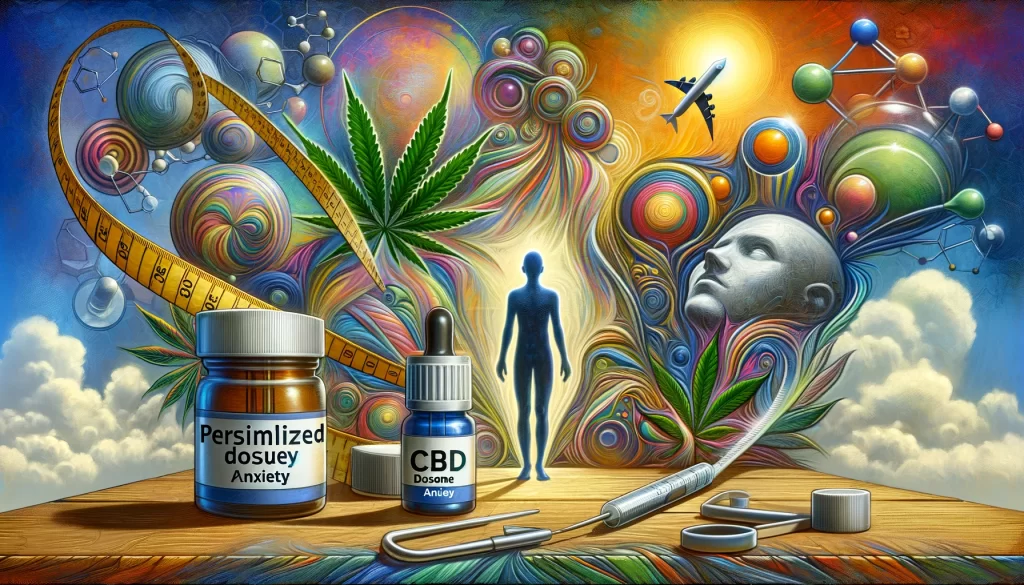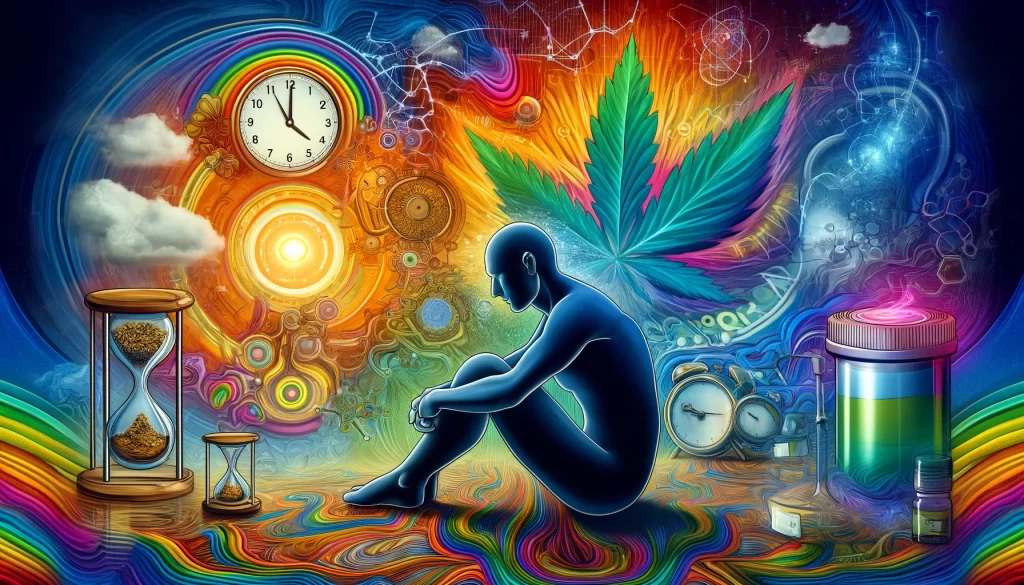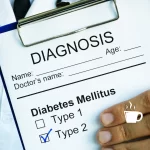Physical Address
304 North Cardinal St.
Dorchester Center, MA 02124

Anxiety affects millions globally, compelling individuals to seek relief through various means. Traditional treatments often come with undesirable side effects, leading many to search for safer alternatives. CBD, or cannabidiol, has emerged as a natural contender, gaining popularity for its potential to ease anxiety without inducing a psychoactive high.
This guide delves into how CBD can be a game-changer in managing anxiety symptoms naturally. It offers an in-depth look at its benefits, usage, and the scientific mechanisms behind its calming effects, providing valuable insights for those considering this holistic approach.

CBD, or cannabidiol, is a non-psychoactive compound found predominantly in the cannabis and hemp plants. It’s one of over a hundred cannabinoids derived from these plants, yet it stands out for its potential health benefits without the high associated with THC (tetrahydrocannabinol), another well-known cannabinoid.
The interest in CBD has surged due to its therapeutic properties, which users claim include alleviating pain, reducing inflammation, and notably, managing anxiety. Unlike THC, CBD does not cause euphoric effects, making it an appealing option for those seeking relief from symptoms without altering their mental state.
Extraction methods for CBD focus on preserving the purity and potency of the compound. It is commonly extracted from the hemp plant to ensure low levels of THC and is available in various forms such as oils, tinctures, capsules, and edibles. Each form offers different benefits and modes of consumption, catering to individual preferences and medical needs.
Legally, CBD products derived from hemp with less than 0.3% THC are permissible in many regions, thanks to changes in legislation recognizing its low risk and potential health benefits. However, users are always advised to check local laws before purchasing or using CBD products to ensure compliance and safety.
Scientific research into CBD is ongoing, with studies aimed at understanding its effects on the human body and its potential role in treating various conditions. While preliminary results are promising, comprehensive clinical trials are needed to establish concrete guidelines for its use in medical practice.

CBD’s potential to assist with anxiety is rooted in its interaction with the body’s endocannabinoid system (ECS), a complex network of receptors that regulate various physiological processes including mood, pain, sleep, and immune system responses. CBD influences this system, which may help in managing anxiety symptoms.
Scientific studies suggest that CBD can affect the serotonin signals in the brain. Serotonin is a neurotransmitter that plays a critical role in mental health; low levels are commonly associated with depression and anxiety. By modifying the serotonin pathways, CBD may act similarly to antidepressant and anti-anxiety medications, which work by regulating serotonin levels in the brain.
One of the ways CBD is thought to reduce anxiety is by enhancing the action of natural cannabinoids in the ECS, such as anandamide, known for its mood-elevating effects. Anandamide is often referred to as the “bliss molecule” and plays a role in generating feelings of happiness and well-being. CBD helps prevent the breakdown of this molecule in the brain, potentially leading to a reduction in anxiety levels.
Moreover, studies have shown that CBD can also help reduce the physiological effects of anxiety, such as elevated heart rate and cortisol levels. This suggests that CBD not only helps manage the emotional symptoms of anxiety but also the physical ones, providing a holistic approach to treatment.
Despite these promising aspects, further research is needed to fully understand how CBD works for anxiety and to establish standardized dosing guidelines. Nonetheless, the existing research provides a strong foundation for CBD as a potentially significant aid in anxiety management.

The effectiveness of CBD in managing anxiety can vary significantly based on its form, making the choice of product crucial for users. Among the various options, CBD oils and tinctures are particularly favored for their efficiency and versatility in dosage management.
CBD oils are usually administered sublingually—drops are placed under the tongue and held for a minute or so before swallowing. This method allows for quick absorption of CBD into the bloodstream through the mucous membranes in the mouth, offering rapid relief from anxiety symptoms. Users appreciate the control over dosage that oils provide, allowing for adjustments based on the severity of their anxiety.
Tinctures, while similar to oils, are often alcohol-based and can also be used sublingually. The presence of alcohol increases the absorption rate, potentially making tinctures a quicker alternative to oils. However, both forms are effective in their own right and cater to personal preference and sensitivity to ingredients.
Edibles, including gummies and capsules, provide another popular way to consume CBD. These products offer longer-lasting effects due to the slow release of CBD as food is digested. This makes edibles a suitable option for those needing sustained relief throughout the day, although the onset of effects is slower compared to sublingual methods.
Topical applications, such as creams and balms, are less common for anxiety but can be beneficial for relieving physical symptoms related to stress, such as muscle tension. While topical products are primarily targeted at addressing localized pain, the soothing effect can indirectly contribute to overall calmness and reduced anxiety.

Determining the correct dosage of CBD for anxiety management is a key component of its effective use, yet it can be one of the most challenging aspects. Unlike many medications, CBD does not have a universally prescribed dosage, and its effects can vary widely among individuals. This variability necessitates a personalized approach to dosing.
For those new to CBD, the common recommendation is to start with a low dosage and gradually increase it. This method, often referred to as “titration,” allows the user to monitor their body’s response and adjust the dosage accordingly. A typical starting point might be a small dose of around 10 to 20 milligrams per day, with gradual increases every week until the desired effects are achieved.
It’s important for users to consider factors such as their body weight, the severity of the anxiety symptoms, and their overall health condition when determining their initial dose. Additionally, the concentration of CBD in the product must be taken into account, as this can vary widely across different oils, tinctures, and edibles.
Consultation with a healthcare provider who has experience with CBD is highly advisable. A professional can offer guidance based on current research and clinical experience, providing insights that can help mitigate risks and maximize the therapeutic benefits of CBD.
Lastly, keeping a diary of dosage and effects can be incredibly useful. Documenting the amount of CBD taken, the time of consumption, and the subsequent feelings and symptoms can help refine the dosage to better suit individual needs, leading to more effective anxiety management.

While CBD is generally considered safe, it is not without potential side effects, particularly when taken in large doses or without proper guidance. Awareness of these side effects can help users make informed decisions about incorporating CBD into their anxiety management regimen.
Common side effects associated with CBD include mild drowsiness, which is often reported by new users or when taken in high doses. This can be beneficial for individuals with anxiety who struggle with sleep, but it may be inconvenient for those who need to remain alert throughout the day. Adjusting the dosage or timing of consumption can help mitigate this effect.
Other potential side effects include dry mouth, which is a common response to many cannabinoids. Staying hydrated and using mouthwashes can help alleviate the discomfort associated with this side effect. Some users might also experience changes in appetite or mood, which should be monitored closely, especially in individuals with pre-existing mental health conditions.
In addition to these, CBD may interact with other medications, particularly those that are metabolized by the liver. Such interactions can affect how medications are processed by the body, potentially leading to adverse effects. It’s essential to consult with a healthcare provider before starting CBD, particularly if other medications are being used.
Despite these potential side effects, the majority of users find CBD to be a tolerable and beneficial aid in managing anxiety. By starting with a low dose and paying close attention to the body’s response, most people can enjoy the benefits of CBD with minimal discomfort.

The timeframe in which individuals may begin to notice the effects of CBD for anxiety varies considerably based on the method of consumption, individual body chemistry, and the nature of the anxiety being treated. Understanding these variables can help set realistic expectations and optimize the use of CBD.
For those using sublingual oils or tinctures, the onset of effects can be relatively quick. Because these products are absorbed directly into the bloodstream through the mucous membranes in the mouth, effects can sometimes be felt within 30 minutes. This makes sublingual administration ideal for acute anxiety episodes where rapid relief is desired.
Conversely, edibles and capsules, which must pass through the digestive system before being metabolized, can take anywhere from one to two hours to begin working. While slower to act, the effects of edibles tend to last longer, making them suitable for sustained symptom management rather than immediate relief.
Inhalation methods, such as vaping CBD, provide the quickest delivery with effects often felt within minutes. However, the duration of effects is generally shorter compared to other forms, and the long-term health impacts of vaping are still under investigation.
Consistency is key when using CBD for anxiety. Regular use helps maintain a stable level of CBD in the body, contributing to ongoing management of symptoms. Users might not see full benefits immediately and may need several weeks of consistent use to fully gauge the effects.
Finally, it’s important to remember that while some may experience immediate benefits from CBD, others may need to adjust their dosage, change their method of consumption, or allow more time to see significant changes. Patience and persistence, along with professional guidance, are crucial in finding the right balance.

The legality and safety of CBD use are significant considerations for anyone looking to start using CBD for anxiety. It’s important to understand both the legal landscape and health implications to ensure a safe and compliant approach.
In the United States, the legality of CBD hinges on its source. CBD derived from hemp, which contains less than 0.3% THC, is legal at the federal level thanks to the Farm Bill passed in 2018. However, state laws can vary widely, with some states imposing stricter regulations on CBD products. It’s essential for users to review their local laws to avoid legal issues.
Regarding safety, CBD is generally regarded as safe by many health professionals, especially when compared to other treatments for anxiety that might have more severe side effects. Numerous studies have supported the safety profile of CBD, highlighting its low risk of significant side effects. However, as with any supplement, there can be individual differences in how people react to CBD.
Quality control is another crucial aspect of ensuring the safety of CBD products. The market is flooded with various CBD offerings, and not all are created equal. Consumers should look for products that provide third-party lab results, confirming their purity and potency. Reputable brands are typically transparent about their production processes and lab results.
For those considering CBD as an alternative or supplement to traditional anxiety treatments, consulting with a healthcare provider is advisable. This can ensure that the use of CBD does not conflict with other medications or underlying health conditions.
Understanding these factors can help users navigate the use of CBD for anxiety safely and legally, maximizing its potential benefits while minimizing risks.

For individuals seeking a natural method to manage anxiety, CBD presents a compelling option. With its potential to soothe the mind and ease the body without severe side effects, it offers a promising alternative to conventional treatments. It is essential, however, to approach CBD use with careful consideration of dosage, delivery method, and individual health conditions to ensure the best results.
To further explore how CBD can be integrated into your anxiety management routine, consistent use and ongoing education are key. For more detailed guidance on products, dosing, and the latest research, visit our website. For more details, visit the site.




